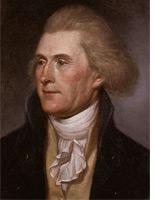- Joined
- Feb 24, 2013
- Messages
- 35,036
- Reaction score
- 19,496
- Gender
- Undisclosed
- Political Leaning
- Conservative
This is absolutely wrong. I can quote Jefferson and Madison as proof.
Jefferson's letter to the Danbury Baptists, 1803
And Jefferson agrees with my statement and you and many others continue to misread Jefferson's statement.
He opposed the establishment of a state religion, not the free expression of religion as a government official. Jefferson also stated that his moral philosophy, on which the founding documents relied, were heavily influenced by the Philosophies of Jesus.
The modern interpretation of Jefferson's "church and state" letter would have those interpreters demanding Jefferson's philosophy not be allowed in government documents.



